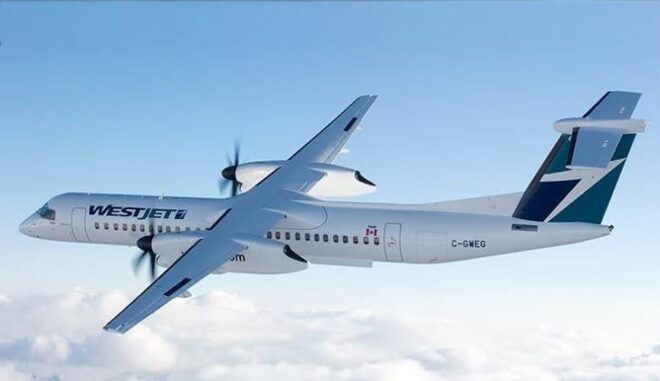
In a move that has left travelers reeling, WestJet has introduced a new set of policies that many are calling the death knell of affordable air travel in Canada. The airline, which once prided itself on offering competitive pricing and excellent customer service, has implemented changes that seem to run counter to its original ethos, sparking outrage among frequent flyers and aviation experts alike.
The changes, which range from increased baggage fees to more restrictive seating policies, have been described as “anti-consumer” by critics, who argue that the new rules disproportionately affect budget-conscious travelers. As complaints flood in from customers, many are questioning whether this marks the beginning of the end for affordable air travel in Canada — and whether WestJet is about to lose its place as the airline of choice for many Canadians.
A Brief History of WestJet’s Rise
Founded in 1996, WestJet initially entered the aviation market as a low-cost alternative to the more established Air Canada. With a strong emphasis on customer service, no-frills pricing, and a sense of community, the airline quickly grew in popularity. WestJet carved out a niche for itself, offering affordable flights without sacrificing safety or reliability, and became a beloved Canadian brand.

For over two decades, WestJet maintained a balance between keeping fares low and providing a high-quality travel experience. Flyers could expect a smile from the cabin crew, reasonable baggage fees, and clear, upfront pricing with few surprises. The airline’s “no-nonsense” approach allowed it to expand domestically and internationally, and it garnered a loyal customer base in the process.
However, recent years have seen significant shifts in WestJet’s business model, and some argue the airline is moving away from its core values. In May 2019, WestJet was purchased by the private equity firm Onex Corporation for $5 billion, marking a turning point in the company’s strategy. Since then, the airline has increasingly focused on cutting costs and increasing revenue streams, leading to the controversial policy changes that have left so many travelers frustrated.
The New Policy: What’s Changed?
The policy changes announced by WestJet are extensive and have been described as a direct attack on the budget-conscious traveler. Below is a breakdown of the most significant changes:
1. Increased Baggage Fees: The most talked-about change is the hike in checked baggage fees. What was once a relatively affordable $30 charge for the first checked bag has ballooned to $50. The second checked bag, previously priced at $50, will now cost travelers $70. For families traveling together or anyone needing more than a carry-on, this fee increase could result in significantly higher costs.
2. New Seat Selection Charges: Another major change is the introduction of a mandatory seat selection fee on basic fare tickets. While seat selection was previously optional, WestJet now requires passengers to pay a fee if they want to choose where they sit — even on the most basic economy tickets. The cost of selecting a seat ranges from $10 to $50, depending on the flight’s length and seating location, adding yet another expense to what was once an affordable fare.
3. Restricted Carry-On Allowance: WestJet has also implemented stricter rules around carry-on baggage. Under the new policy, passengers are only allowed one personal item (such as a backpack or purse) on board unless they pay an additional fee for a standard carry-on bag. This new rule has been particularly frustrating for frequent travelers who rely on carry-ons to avoid checked baggage fees.
4. Fare Structure Overhaul: The airline has overhauled its fare structure, which many find confusing and opaque. WestJet now offers four distinct fare classes — Basic, Econo, Flex, and Premium — each with its own set of restrictions and benefits. Basic fares, the cheapest option, come with a slew of limitations, including no flight changes or cancellations, no complimentary seat selection, and no baggage allowances. For many travelers, what was once a straightforward booking process has become an exercise in deciphering the fine print.
5. Fuel Surcharges Return: In a less-publicized move, WestJet has reintroduced fuel surcharges, a fee that had largely disappeared in the industry over the last decade. This surcharge, depending on the flight, could add another $20 to $50 per ticket, further eroding the affordability of air travel for many passengers.
Why Now?
The timing of these changes has led to speculation about the financial state of WestJet. Some aviation analysts suggest that the airline’s decision to introduce these controversial policies is tied to the challenges of operating in a post-pandemic world. Like many other carriers, WestJet suffered significant losses during the COVID-19 pandemic, as travel ground to a halt and the demand for flights plummeted. Now, with the industry slowly recovering, airlines are looking for ways to recoup lost revenue.
However, critics argue that WestJet is going too far in its pursuit of profit. While it’s understandable that airlines need to be financially sustainable, they argue that WestJet’s new policies are excessively punitive to customers. “It feels like they’re nickel-and-diming us at every opportunity,” says Amanda Cormier, a WestJet customer from Calgary. “I used to fly with WestJet because I felt like they cared about their passengers. Now, it just feels like they care about how much they can squeeze out of us.”
Customer Backlash
Unsurprisingly, the reaction from WestJet’s customer base has been overwhelmingly negative. Social media is flooded with complaints from disgruntled travelers who feel blindsided by the new fees. Many long-time customers have expressed their frustration, with some even vowing to take their business elsewhere.
“I’ve been flying WestJet for 15 years, but these new fees are outrageous,” says James McLean, a frequent flyer from Vancouver. “I’ll be looking at other airlines from now on. I’m done with them.”
The backlash hasn’t been limited to individual passengers. Consumer advocacy groups have also weighed in, calling WestJet’s changes a step in the wrong direction for the industry. “These policies disproportionately affect low-income travelers, families, and seniors,” says Karen Stevens, spokesperson for the Canadian Consumer Coalition. “What we’re seeing here is an airline that’s prioritizing profits over people, and that’s deeply concerning.”
The Future of WestJet
While the immediate reaction to WestJet’s new policies has been negative, the long-term impact on the airline remains to be seen. Some analysts predict that the backlash could lead to a significant loss of customers, particularly as competitors like Air Canada and smaller airlines continue to offer more competitive pricing and customer-friendly policies.
Others, however, argue that WestJet’s loyal customer base will eventually accept the changes as part of a broader industry trend. After all, other major airlines around the world have introduced similar policies, and while there may be initial outrage, many travelers ultimately adapt.
Still, there’s no denying that WestJet’s reputation has taken a hit. For an airline that built its brand on affordability and customer service, these new policies represent a significant departure from its roots. Whether WestJet can recover from the fallout remains to be seen, but one thing is clear: for many Canadians, affordable air travel just got a lot more expensive.